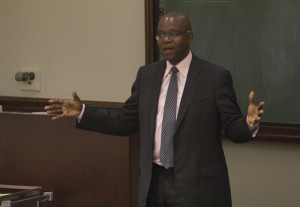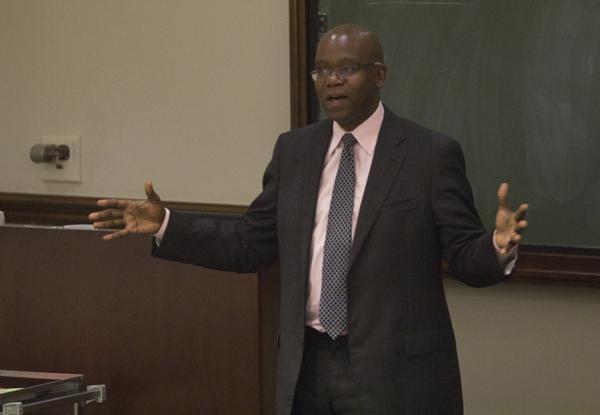
Even in remote areas of developing countries, finding an ice cold Coca-Cola is an easy task. Less easy to find is a cure for cervical cancer, but Dr. Eric G. Bing envisions a world where medical care and soda are equally obtainable.
And when vinegar is the only ingredient needed to test for signs of cervical cancer, Bing’s idea doesn’t seem so out of reach.
The director for global health at the Bush Institute informed a room of SMU students that a technician could be trained to detect cervical lesions with just vinegar, and then freeze them in the same way warts are treated.
Bing presented “Making a Cure for Cancer as Accessible as a Coca-Cola” Wednesday night and shared his passion for global healthcare.
Cervical cancer prevention was just one example of inexpensive medical procedures, but one that is close to Bing’s heart.
He told the story of a patient who found out she had cervical cancer too late. She lived in the United States where healthcare is widely available, but still experienced tremendous pain before her death.
“This is my mother I’m talking about,” Bing said after the story. “I thought to myself, ‘how in the world could the mother of a doctor die of such an easily preventable disease?’”
This heightened Bing’s concern for those with even less of a shot at leading healthy lives. He now creates programs aimed at solving global health issues and encourages others to join.
“Many of the solutions will come from people who think very, very differently than doctors and nurses,” Bing said.
On a trip to renovate a health clinic in Zambia this summer, Bing selected SMU students majoring in different subjects to bring varied perspectives to the project. He promoted the Bush Institute as a great place for students who want to make a difference, regardless of political views. “It’s about solving problems. So whoever you are, whatever you are, you have a place there,” Bing said.
Students in attendance of the event were eager to learn about the opportunities offered by the Bush Institute. Alpha Epsilon Delta, the health preprofessional honor society, hosted the lecture, so some students already knew of Bing’s work.
First-year Gillian Wright said she admires Bing’s passion for global healthcare. She aspires to be a surgeon and also wants to help those in developing countries. “I’m not in it for the money, I’m in it to make people’s lives better,” Wright said.
Bing sees the less fortunate as individuals full of potential, living in an environment that does not facilitate well-being. He hopes for a future where poor health would not be a limiting factor.
“My real goal, my real passion is to make healthcare as accessible as a Coke,” Bing said. “And we don’t know where the solution will come from. It may even come right from here at SMU, from one of you.”









